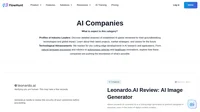Artificial Intelligence (AI) in healthcare is a rapidly evolving field that leverages complex algorithms and software to emulate human cognition for analyzing, interpreting, and comprehending complex medical and healthcare data. As healthcare systems worldwide grapple with challenges such as managing patient care, enhancing operational efficiency, and controlling costs, AI emerges as a transformative force. By harnessing advanced technologies like machine learning, natural language processing, and predictive analytics, AI enhances healthcare delivery, improves patient outcomes, and optimizes operational efficiency. According to recent studies, the integration of AI in healthcare is not just a technological advancement but a reconceptualization of how healthcare is delivered, emphasizing personalized and precise patient care.
Key AI Technologies in Healthcare
- Machine Learning (ML): As a subset of AI, machine learning involves training algorithms on vast datasets to identify patterns and make decisions. ML is particularly useful in predictive analytics for disease diagnosis and treatment recommendations. The application of ML in healthcare has proven instrumental in predicting patient outcomes and identifying potential health risks before they manifest, thus facilitating preemptive medical interventions.
- Natural Language Processing (NLP): This technology enables computers to understand and interpret human language. NLP is used in applications like transcribing medical records and extracting information from clinical notes. The advancements in NLP have significantly enhanced telemedicine by improving patient-provider communication and enabling more accurate symptom analysis.
- Deep Learning: A more advanced form of ML, deep learning utilizes neural networks with multiple layers. It excels in image and speech recognition, making it ideal for analyzing medical imaging data. By leveraging deep learning, healthcare providers can achieve dermatologist-level classification of diseases and enhance diagnostic accuracy, especially in interpreting complex imaging data such as MRIs and CT scans.
AI Applications in Healthcare
Medical Diagnosis
AI-powered algorithms analyze medical imaging data, such as X-rays, MRIs, and CT scans, assisting healthcare professionals in making accurate and swift diagnoses. AI systems detect patterns and anomalies that may be overlooked by human clinicians, leading to earlier interventions and improved patient outcomes. For instance, AI applications in diagnostic imaging have demonstrated substantial success in identifying conditions like cancer at stages where human detection is challenging.
Example: IBM Watson’s use in diagnosing rare childhood illnesses by analyzing clinical records and medical journals has highlighted the potential of AI in enhancing diagnostic precision.
Drug Discovery
AI accelerates the drug development process by analyzing vast datasets to identify potential drug candidates and predict their efficacy. This reduces the time and cost associated with bringing new drugs to market. AI-driven platforms have successfully expedited the discovery of treatments by identifying compounds with high efficacy potential, exemplified by the accelerated development of COVID-19 therapeutics.
Use Case: AI’s role in speeding up the development of COVID-19 treatments by identifying compounds with high efficacy potential demonstrates its transformative impact on pharmacological research.
Patient Experience
AI enhances patient engagement through virtual assistants that provide schedule reminders, health tips, and personalized care suggestions. AI also aids in streamlining patient interactions, reducing wait times, and improving communication between patients and healthcare providers. The implementation of AI chatbots for symptom-checking and appointment scheduling has significantly improved patient satisfaction by offering timely and accurate healthcare guidance.
Example: AI chatbots offering symptom-checking and appointment scheduling enhance patient satisfaction by improving accessibility and responsiveness in healthcare services.
Data Management
AI systems manage and analyze massive volumes of healthcare data, breaking down data silos and connecting disparate pieces of information. This capability enhances research, improves diagnostic accuracy, and streamlines administrative tasks. AI’s role in providing real-time analytics for electronic health record (EHR) management is a testament to its potential to revolutionize healthcare data management.
Example: AI’s role in providing real-time analytics for electronic health record (EHR) management underscores its capacity to transform healthcare data management practices.
Robotic Surgery
AI assists in robotic surgeries by providing precision and control that surpasses human capabilities. It allows surgeons to perform minimally invasive procedures with higher accuracy and reduced recovery times. AI-driven robotic systems are pivotal in complex surgeries, offering enhanced precision and reducing the risk of procedural errors.
Case in Point: The use of AI-driven robotic systems in complex surgeries, such as open-heart procedures, exemplifies the advancements in surgical precision and patient safety.
Benefits of AI in Healthcare
- Improved Diagnostics: AI systems provide more accurate diagnoses by analyzing data with greater precision, thereby reducing diagnostic errors and enhancing patient safety.
- Personalized Treatment: AI enables the creation of personalized treatment plans based on a patient’s unique genetic makeup and medical history, significantly improving therapeutic outcomes.
- Operational Efficiency: By automating routine tasks, AI reduces administrative burdens, allowing healthcare professionals to focus more on patient care and reducing burnout.
- Cost Reduction: AI helps in predicting and managing resource allocation, thus reducing healthcare costs and improving the financial sustainability of healthcare systems.
Challenges and Considerations
- Data Privacy and Security: Protecting sensitive patient information is paramount as AI systems handle massive datasets. The challenge lies in ensuring robust data security measures to prevent breaches and unauthorized access.
- Ethical Concerns: The use of AI in decision-making raises ethical questions, including bias in algorithms and patient consent. Addressing these concerns requires a balanced approach that emphasizes transparency and accountability.
- Integration with Existing Systems: Seamless integration of AI technologies with current healthcare systems is necessary to maximize benefits. This involves overcoming technical and infrastructural barriers to ensure smooth adoption and implementation.
Future of AI in Healthcare
The future of AI in healthcare is promising, with advancements expected in areas such as predictive analytics, personalized medicine, and remote patient monitoring. As AI technologies evolve, their integration into healthcare systems will likely lead to more proactive and preventive care approaches, ultimately improving global health outcomes. AI has the potential to revolutionize healthcare by making it more efficient, personalized, and accessible. As AI technologies continue to mature, their impact on the healthcare industry will grow, offering new opportunities to enhance patient care and operational efficiencies. Embracing AI in healthcare is not just about technology adoption but about transforming the entire approach to healthcare delivery and management.
Data-backed Content With No Fluff
Create data-driven content with FlowHunt’s AI tools. From idea generation to editing, streamline your process for engaging, SEO-optimized results!



